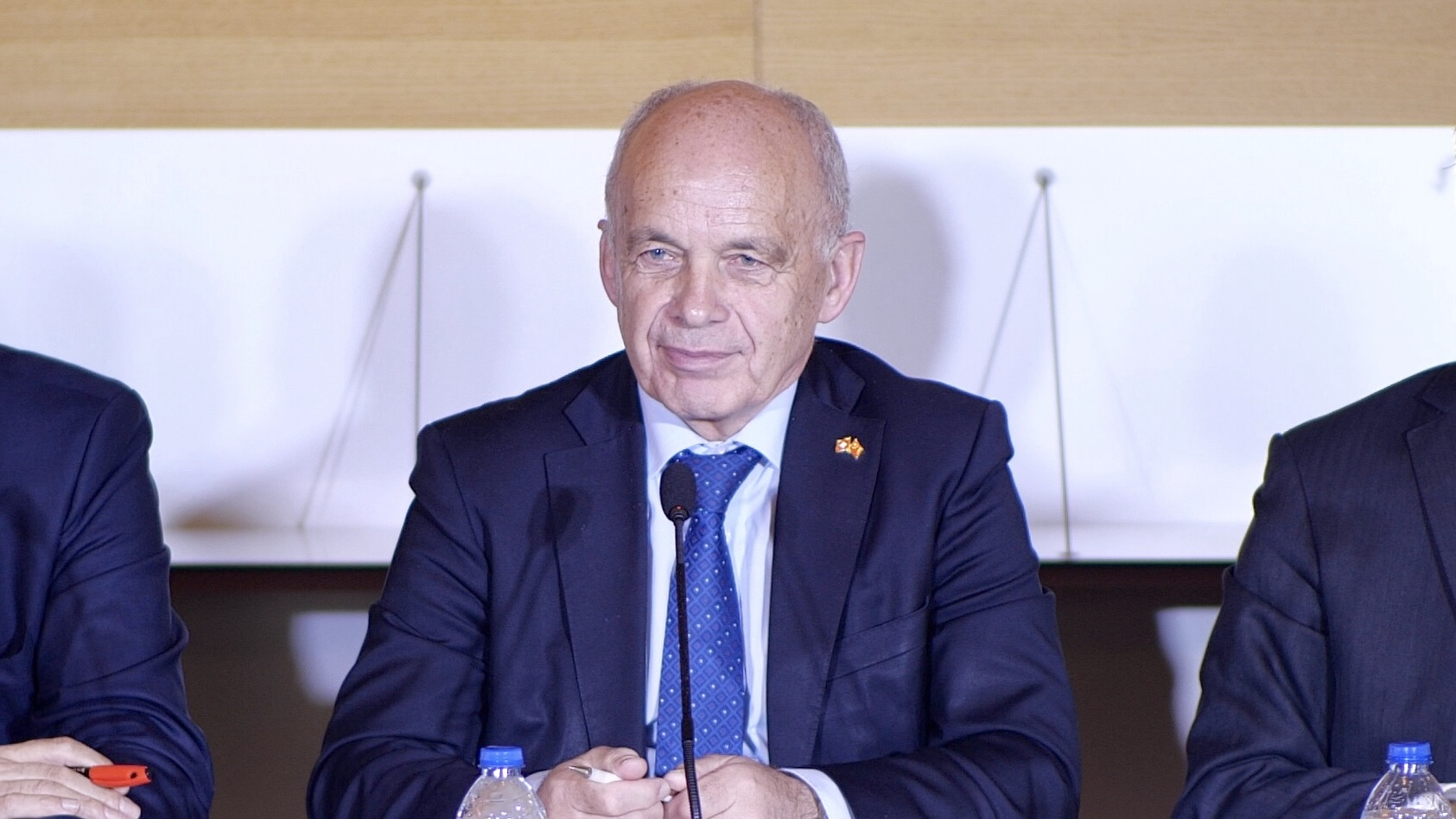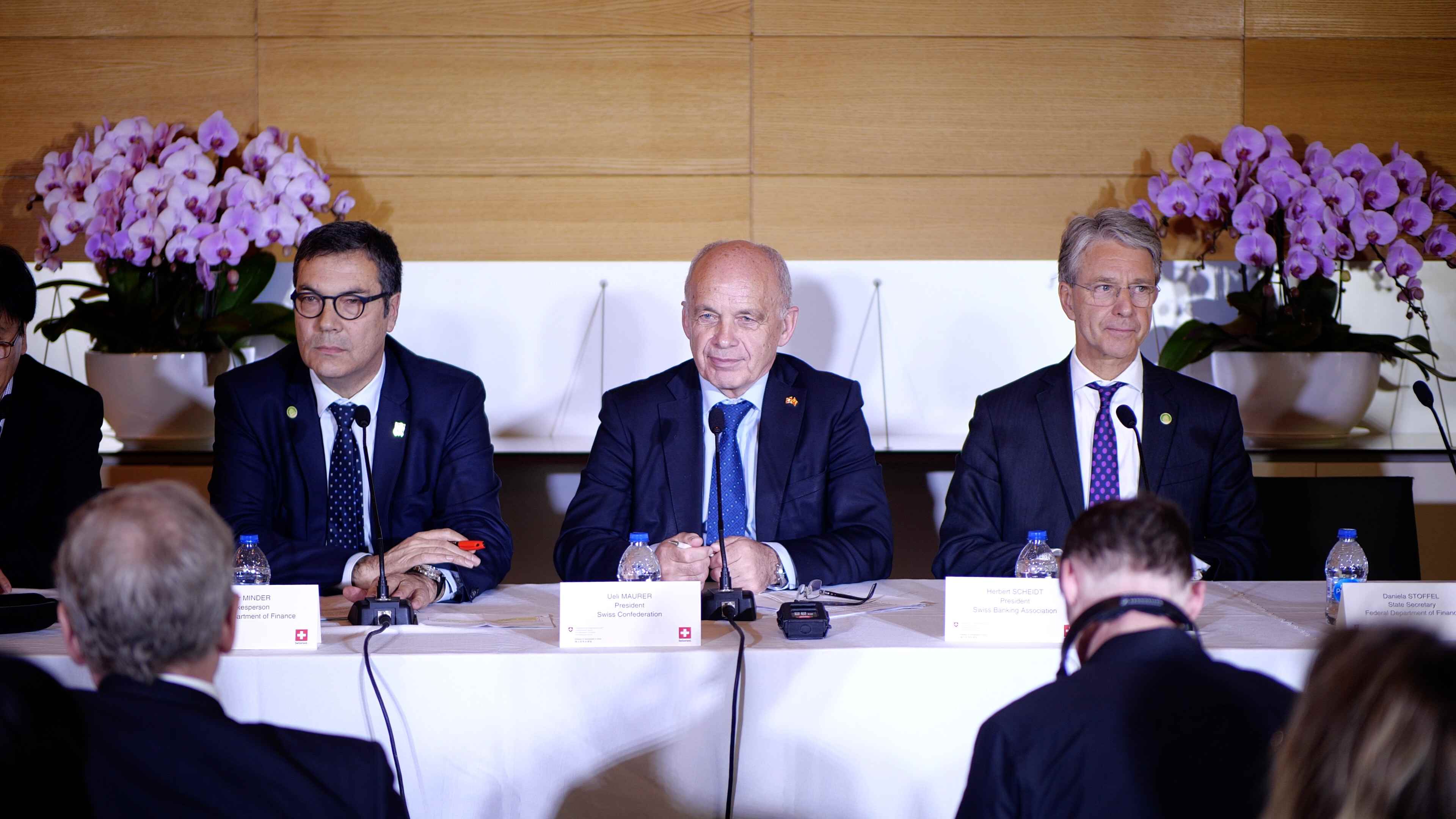01:09

Swiss President Ueli Maurer announced on Thursday that Switzerland formally supports China's modern-day Silk Road initiative during a press conference at the Swiss embassy in Beijing.
Maurer, also Switzerland's finance minister, is on a week-long trip to China together with a business and finance delegation, taking part in the second Belt and Road Forum in Beijing that opened on Friday. Chinese President Xi Jinping invited Maurer for a state visit to china which begins on April 29, during which the two sides are set to sign a memorandum of understanding (MoU) to intensify cooperation on trade, investment and project financing in third markets along the routes of the Belt and Road Initiative (BRI).
The MoU will create equal conditions for Chinese and Swiss firms and will be the first of other agreements that will follow, Maurer told the media.
"The projects within the BRI are the most important investment projects of this century. If we want prosperity – and we want prosperity – there has to be investment first," Maurer said. "This project will serve the entire world, and we are happy to make a small contribution to it."
After Italy signed an MoU on March 24, becoming the first Group of 7 country and founding EU member to get on board with the expansive initiative, and Luxembourg, which joined during its prime minister's visit to China on March 27, Switzerland's signing makes it the latest central European state to make a BRI deal with China. Greece, Portugal, and Eastern European countries including Hungary and Poland are already part of it, totaling 26 countries that signed cooperation agreements with China.

Ueli Maurer, president of the Swiss Confederation and federal councilor of finance (C), speaks to the media ahead of the second Belt and Road Forum in Beijing, April 25, 2019, in Beijing. /Qi Jianqiang, CGTN Photo
Ueli Maurer, president of the Swiss Confederation and federal councilor of finance (C), speaks to the media ahead of the second Belt and Road Forum in Beijing, April 25, 2019, in Beijing. /Qi Jianqiang, CGTN Photo
Cultivating contacts
Switzerland supporting the initiative is to be understood in the context of deepening their bilateral relations, Maurer said. Switzerland seeks to harness the new connections and opportunities for its economy, in particular, its finance and insurance industries, provided by the huge project that spans land and sea routes over Eurasia to Africa and the Americas. It could be a smart move, considering that other small states, such as New Zealand and Singapore, have been able to leverage their competitive advantage in the BRI.
"Swiss companies can benefit from the BRI, while China benefits from the know-how and the reputation of Swiss companies," Professor Ruedi Nützi, director of the School of Business at the University of Applied Sciences and Arts Northwestern Switzerland, told CGTN Digital.
The small state wants to further cultivate its close contacts with China to create as many win-win situations as possible for both nations, Nützi concluded.
Nützi, who was awarded the 2014 Friendship Award by China for his efforts in strengthening cooperation in education, research, and innovation between the two nations, stressed the importance of the rapid launch of Sino-Swiss projects within the BRI to create positive momentum and calls for concrete action.
But at present, Switzerland's participation in the BRI is only in its starting phase.
"We are waiting for specific projects to take form," Maurer said. The current state visit focuses on creating the basic conditions for Swiss companies for those projects to happen, he said.
Guido Fürer, chief investment officer at the Swiss insurance company Swiss Re, also present at the conference, said that the Swiss finance sector is very interested in working out a standardization that would ensure huge investment volumes in the BRI.

Herbert Scheidt, president of the Swiss Banking Association (L) and Guido Fürer, chief investment officer at the Swiss insurance company Swiss Re, speak about opportunities for the Swiss finance and insurance industry within the Belt and Road, April 25, 2019, in Beijing. /Qi Jianqiang, CGTN Photo
Herbert Scheidt, president of the Swiss Banking Association (L) and Guido Fürer, chief investment officer at the Swiss insurance company Swiss Re, speak about opportunities for the Swiss finance and insurance industry within the Belt and Road, April 25, 2019, in Beijing. /Qi Jianqiang, CGTN Photo
No clear strategy
It's unlikely that Switzerland – a non-EU member and neutral economy – signing a deal with China will alienate the U.S. and large EU member states France and Germany, who have not shown interest in joining the BRI yet.
The U.S. National Security Council responded on Twitter when Italy joined the initiative in March that the BRI will bring "no benefits" to the Italian people and criticized the country's endorsement of China's plan.
"Switzerland does not share the U.S.' rejection of the Belt and Road," Maurer said, explaining that as an independent small state, Switzerland does not adhere to any of the big blocs, but can move freely. Maurer said that the BRI involves some risks, and therefore, formulated five principles for Switzerland's engagement: private capital for private investments, diligence with the emerging debts, social responsibility, environmental sustainability, and transparency.
Nützi said as long as the quality of Swiss export products and services remains satisfactory, trade relations with Germany and other EU states will remain good in the future. But like the EU, Switzerland does not have a coherent strategy for China, which is urgently needed, he said. "Part of this strategy must define which role Switzerland and Swiss agents will take in the BRI."
Further market liberalization
Switzerland is the first and so far only European country to have a free trade agreement (FTA) with China. According to swissinfo.ch, the FTA has saved companies in both countries some 103 million U.S. dollars in customs duties in 2017.
A 2018 study by the Chinese University of International Business and Economics, Nanjing University and the Swiss University of St. Gallen has shown that 60 percent of Swiss companies do not utilize the FTA partly because they feel the bureaucratic effort is too demanding. Further cooperation under the BRI framework may help to further extend the FTA.

Maputo Bridge in Mozambique, a supporter of the Belt and Road, built by the China Road and Bridge Corporation. /VCG Photo
Maputo Bridge in Mozambique, a supporter of the Belt and Road, built by the China Road and Bridge Corporation. /VCG Photo
China and Switzerland have different approaches to the FTA, Nützi explained, stating that China goes by step-by-step market liberalization.
"Switzerland has to make clear demands for the development of the FTA," Nützi said, stressing that continuous dialogue and dedication to reach mutual successes are decisive.
Swiss-Chinese ties extend almost as far back as the founding of the PRC. Switzerland was one of the first Western nations to recognize the PRC as a state in 1950. After China's reform and opening-up, relations intensified. Today, China is Switzerland's largest trading partner in Asia and the third-largest globally after the EU and the U.S.
Read more:
(Top photo: Ueli Maurer, president of the Swiss Confederation and federal councilor of finance, speaks about Switzerland's engagement with the Belt and Road Initiative, April 25, 2019, in Beijing. /Qi Jianqiang, CGTN Photo)





